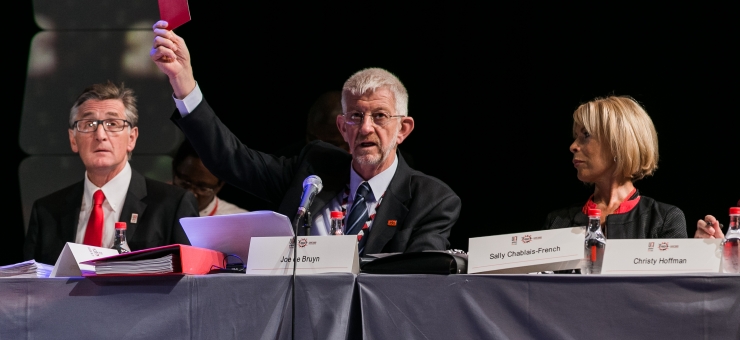News
World will need 1.8 billion new jobs by 2050, new report finds

Cape Town, 9 December 2014: The world will need 1.8 billion new jobs by 2050, a report by UNI Global Union and the New Economics Foundation has found. The report launched today, 9 December 2014 at the 4th UNI World Congress in Cape Town and will form the basis of discussions with 2000 global trade unionists during the New World of Work session on Wednesday, 10 December. This Congress is the largest ever global union gathering to be held in Africa.
Workers can expect a dramatic shortage of jobs within ten years and a critical slide in the quality of work for billions of people, it also warns.
The Future World of Work report examines labour market conditions such as the jobs gap, job polarisation, and skills demand in order to predict likely future trends.
The report predicts that the key changes to impact on the labour market will include:
- As the working age population rises the world will need 1.8 billion new jobs by 2050 to have a 75% level of employment
- While previous estimates predicted 600 million extra jobs would be needed globally this will only sustain employment rates at 61% of what we have today
- If employment levels are to reach 80% then 2.3 billion jobs need to be created
UNI is the global union for the service sector and represents 20 million working people in over 100 countries around the world. Speaking at UNI’s 4th World Congress in Cape Town, South Africa, General Secretary Philip Jennings said, “Let this report sound the warning. A technological tsunami is rolling towards us that will wash away many previously held perceptions of the world.”
“The labour market, trade unions, and, indeed, the entire world must innovate and engage in facing up to this challenge because it will not go away and it will affect us all. We must see massive job creation and a huge new investment in education and skills.”
The report identifies a number of mega-trends driving change in labour markets including weak and uncertain economic performance; population change and demographic shifts from developed countries to emerging economies; technological transformation and digitalisation; fragile international finance and business models, as well as environmental stress.
The report also identifies the following key findings about workers’ conditions:
- Globally, more than 200 million people were unemployed in 2013. The number of unemployed people is set to rise to 215 million by 2018
- Almost half of all working people today are in vulnerable employment that is insecure, temporary and/or poorly paid
- Almost 840 million workers – 27% of all employees – earned US$2 or less per day in 2013
- Massive workforce demographic change will take place from 3.1 billion workers today to 4 billion in 2050, and a shift from 533 million workers in OECD countries to 3.7 billion in emerging economics like Asia-Pacific and Africa
-ENDS-
Notes to editors
- UNI Global Union represents more than 20 million workers in 900 trade unions in the fastest growing sectors in the world – skills and services. A total of 90% of new jobs are expected to be in these sectors in the next decade – www.uniglobalunion.org
- The New Economics Foundation (NEF) is an independent think-tank that specialises in economic valuation – www.neweconomics.org
For more information or to arrange an interview please contact:
Michelle Burt / michelleb@magna-carta.co.za / 083 295 1924
Follow the UNI World Congress on twitter #UNI2014
See the live streaming of the Congress via the UNI website: www.uniworldcongress.org
See the programme and more information on the UNI Congress website: www.uniworldcongress.org

